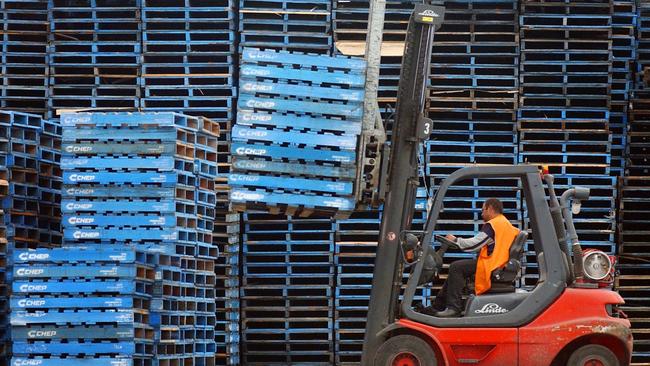A court decision to stop logging in Gippsland has forced leading pallets maker Dormit to slash production by 40pc
Environmental activists have won a court case to stop logging at a key Victorian forest, triggering concerns of pallets shortage in the new year.

There are growing fears of a looming pallets shortage in the new year after a recent court decision banned logging in key parts of Gippsland, eastern Victoria, with the biggest maker of pallets for leading pallet operator CHEP forced to slash production by almost half as hardwood supplies dry up.
A global shortage of pallets — the backbone of the supply chain — emerged during the Covid-19 pandemic and has placed further pressure on retailers and suppliers as they scramble to find pallets to shift their goods and are forced to pay higher prices for the scarce logistic product.
In late 2021, Coles chief executive Steven Cain warned of the critical nature of pallet shortages, dubbing the dire situation “pallet-gate”, and he was joined by Woolworths boss Brad Banducci who warned the shortage of pallets was slowing the delivery of products and causing bottlenecks in the supply chain.
Now with environmental activists this month winning a stunning court victory against state-owned agency VicForests, one of the nation’s key sources of hardwood used for pallets as well as other products has been shut down.
The Dormit mill in outer suburban Melbourne is the biggest supplier of hardwood pallets to CHEP, the global pallets business owned by Brambles, and with its access to Gippsland forestry sites blocked by the Victoria’s Supreme Court decision it has been forced to cut its production by 40 per cent.
Dormit has removed a shift from its production schedule and is trying to source wood from other parts of Australia, but this will come at a cost and is unlikely to avoid shortages next year as pallet production volumes slide and fail to keep pace with demand.
The threatened pallets shortage is also being fuelled by retailers and suppliers hoarding pallets since the pandemic began as they fear being unable to gain access to enough of the logistics product to shift their goods.
It is estimated that there are currently 20 million pallets in the Australian pallet pool. The supply chain disruptions caused by the pandemic has seen a switch in strategy in the wake of the pandemic from “just in time” manufacturing to “just in case”, whereby retailers, suppliers and other businesses bulk up their inventories fearing Covid-19 lockdowns in China, closed ports and other supply bottlenecks will leave them vulnerable.
This has led many pallet users — such as retailers and suppliers — to lift their optimal pallet inventories by 30 per cent, which means an extra six million pallets are needed in Australia to meet this fresh demand.
That pick-up in demand for pallets has now collided with a ruling from the Victorian Supreme Court this month that VicForests had failed to protect endangered greater gliders and yellow-bellied gliders when logging native forests in Gippsland.
Two activist groups – Environment East Gippsland and Kinglake Friends of the Forest — initiated the court action and while an initial injunction last year had still allowed some logging, the court ruling this month has now brought down an injunction that for the time being will shut out logging completely.
The Brambles-owned CHEP pallets business relies heavily on hardwood timber for its pallets.
A spokeswoman for Brambles said it didn’t believe the dramatically slowed production at the Dormit mill would threaten its pallets supply for the peak Christmas period, and it was looking to broaden its supply base for pallets next year.
“The advice is that, with this activity coming so late in the year, we don’t foresee impacts to our pre-Christmas 2022 pallet supply plans.
“For 2023, plans are in place to mitigate any supply issues that might affect new pallet procurement. We have reliable access to certified timber from a range of sources both locally and from overseas and, over the past year, have brought on board several new pallet manufacturers to supply to CHEP.”






To join the conversation, please log in. Don't have an account? Register
Join the conversation, you are commenting as Logout